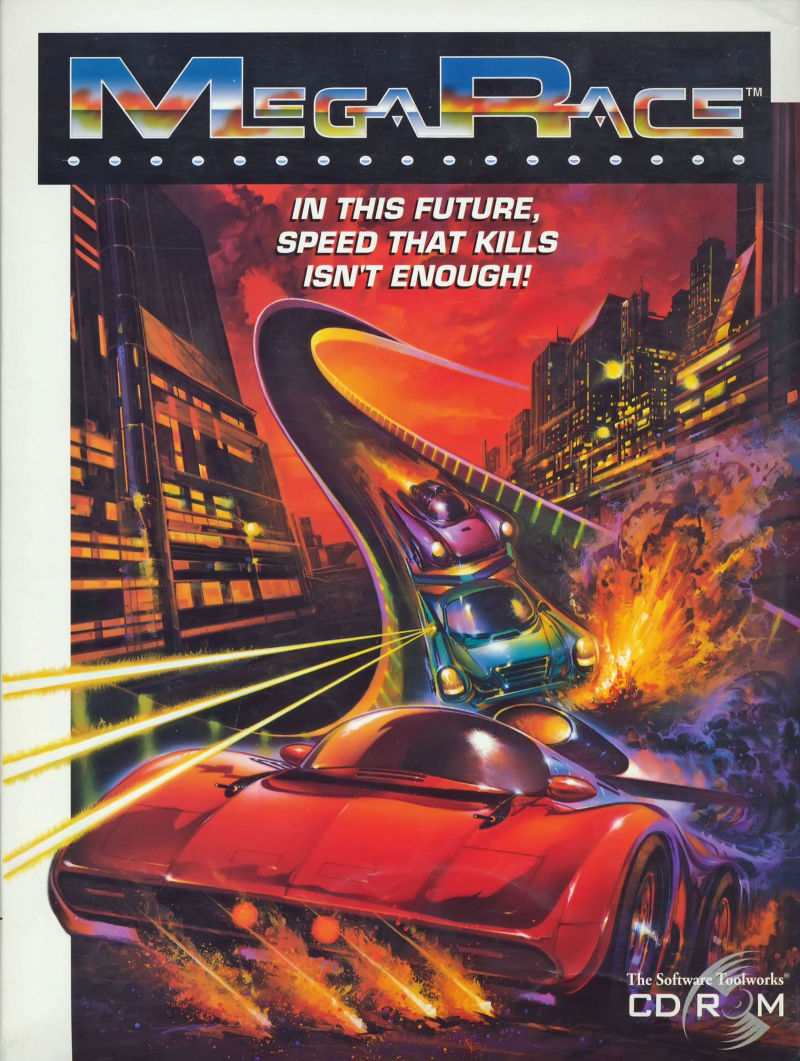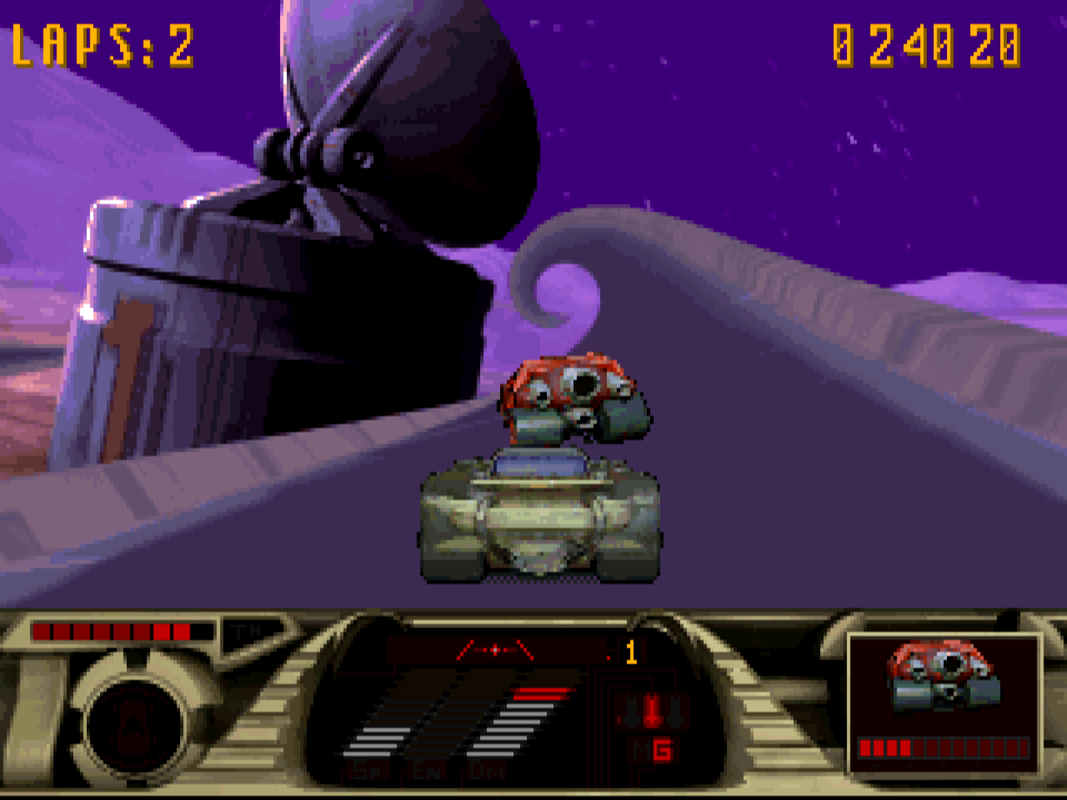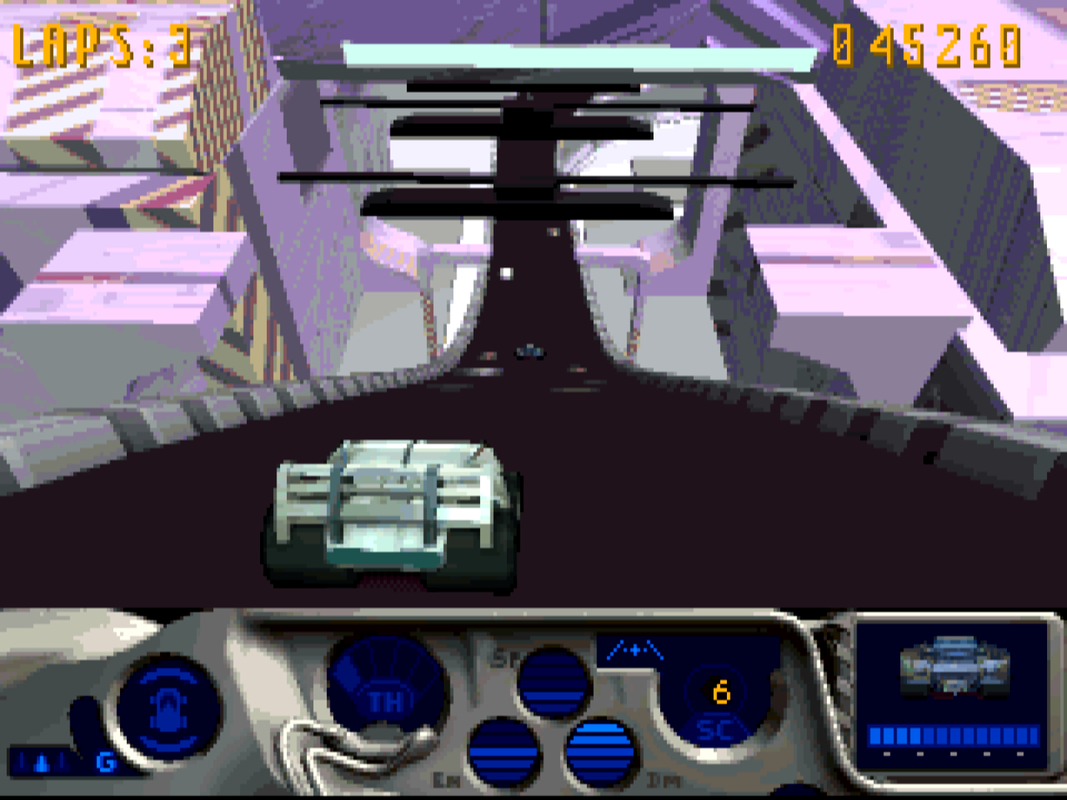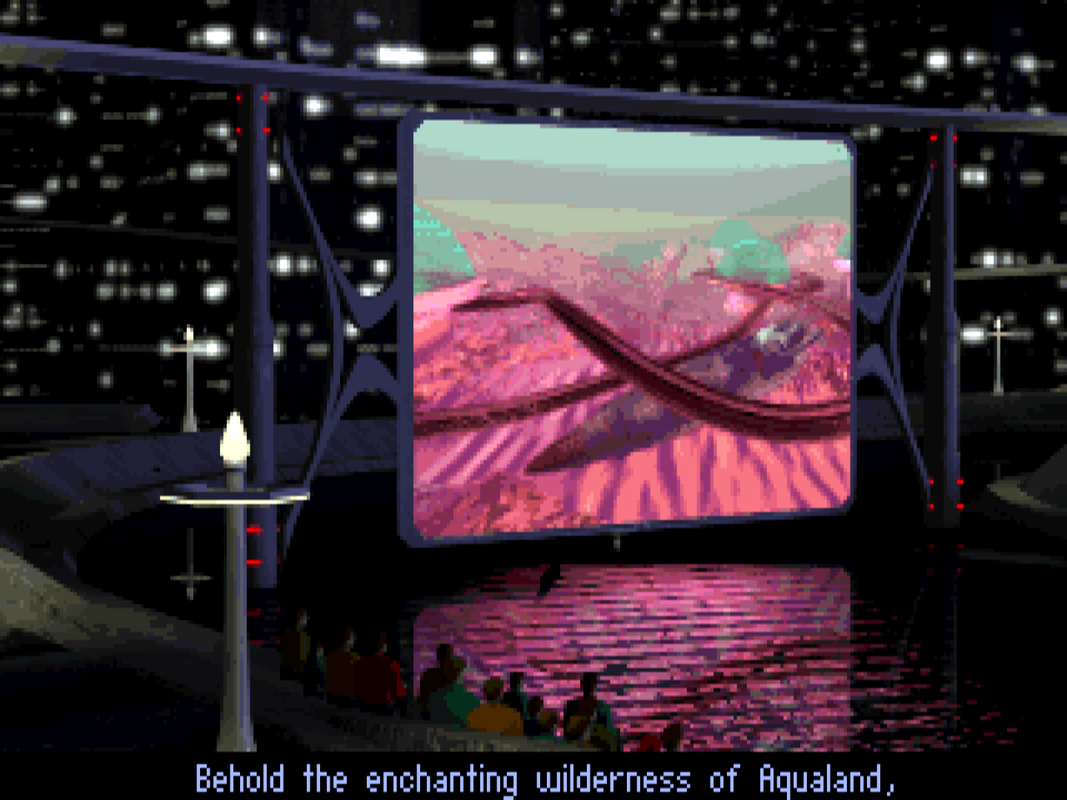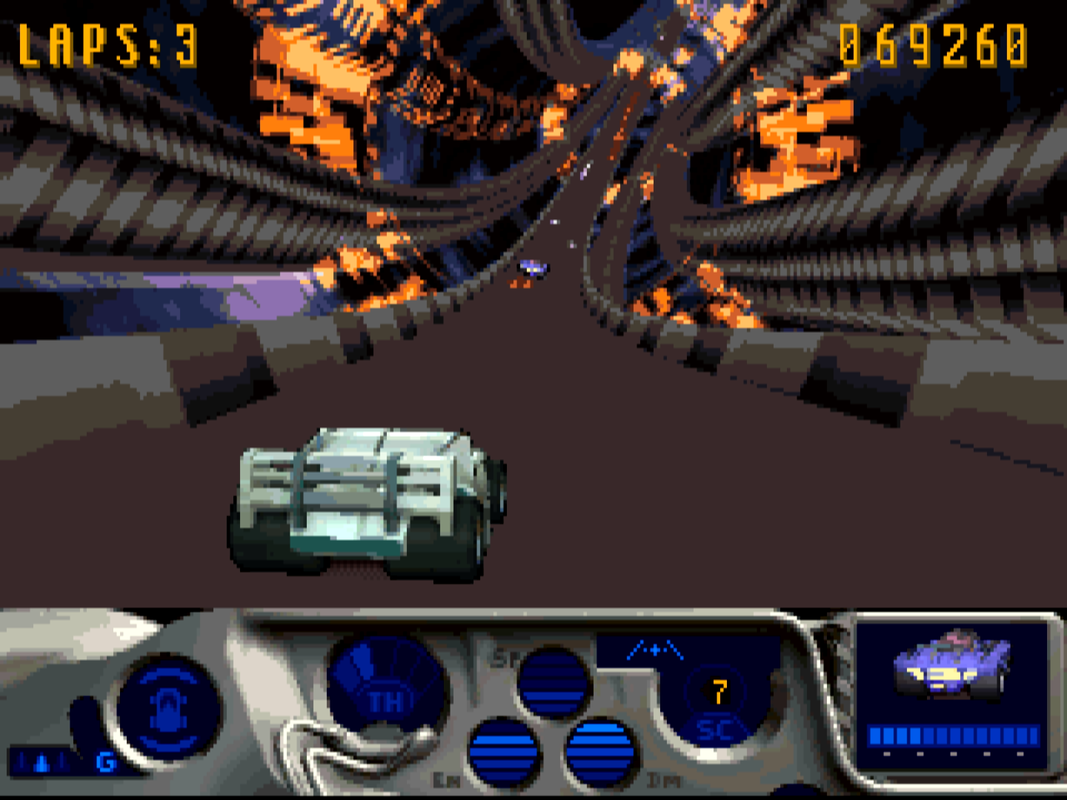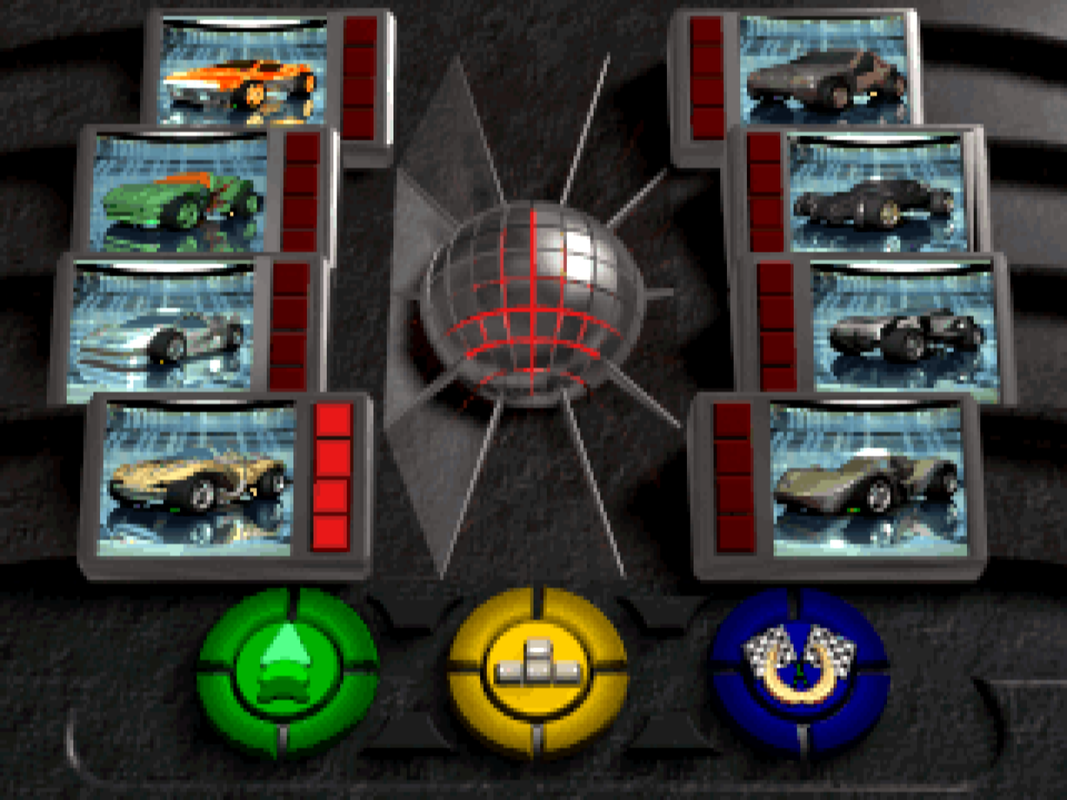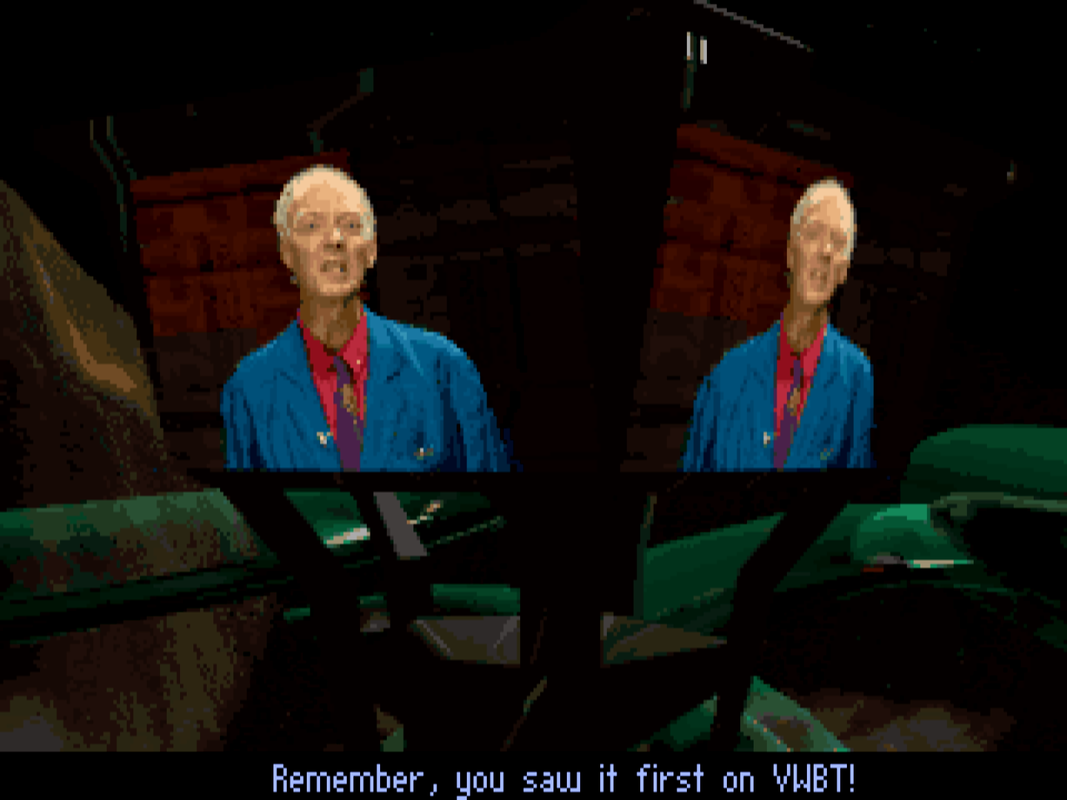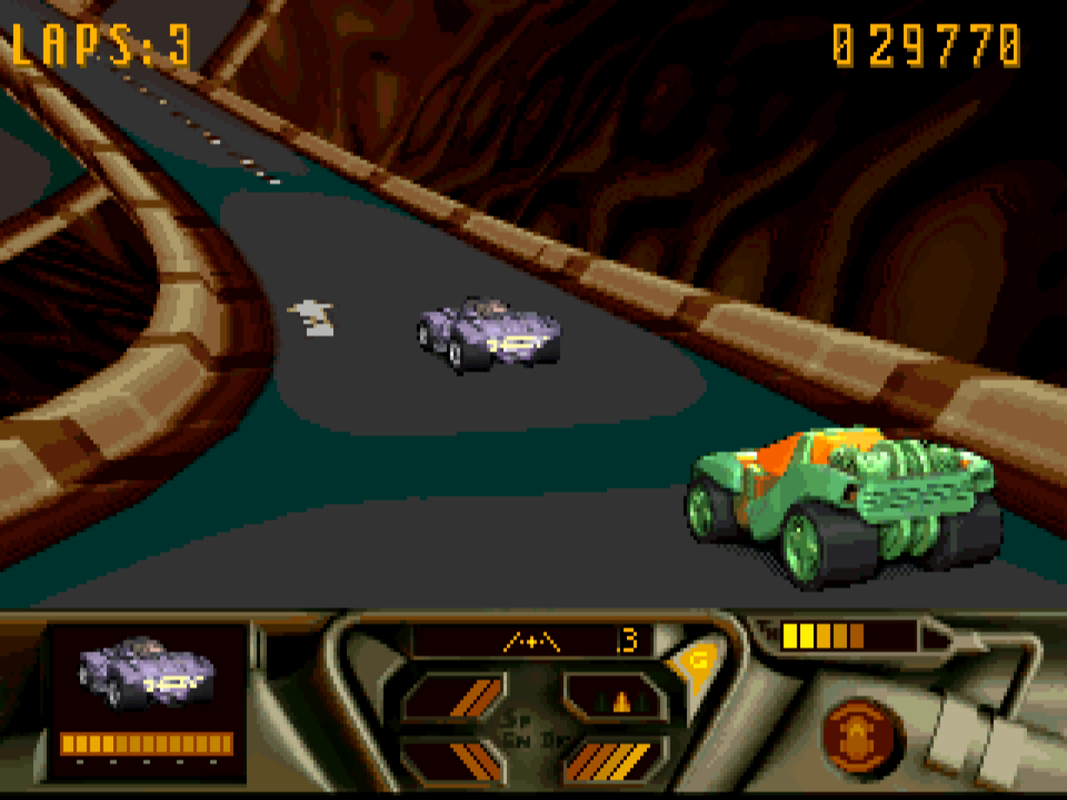MEGARACE (PC)
MegaRace rather neatly encapsulates the fortunes of Cryo Interactive’s output during much of the nineties. Before going Myst-mad and building a catalogue of similar fantasy adventures that included Versailles, Atlantis and China: The Forbidden City, the French developer experimented with a vehicular combat title. With FMVs and pre-renders galore, it bears the hallmarks of its creator. MegaRace fully, garishly commits to its dystopian aesthetic, but fails to build anything resembling a decent gameplay experience around it.
The concept at least is inviting. Host Lance Boyle, unmistakeable in his lurid blue jacket, is played with gaudy chutzpah by Christian Erickson. Boyle revels in his introductory pieces on the various track locations, street gangs and vehicles, delighting equally in your wins and losses. He’s very kitsch, very superficial: both a product and a success story of the world the game projects. Very evidently, the landscape of MegaRace is a bleak one. Life is cheap, entertainment is ever-more extreme. With the pace of change, you can go from hero to zero in a matter of seconds and there's always someone ready to take your place. Occasionally, the game awards mock-prizes between races. Items such as watches, car seat covers and Lance’s (sadly fake) autobiography. These vignettes may seem incongruous, but they lend the jarring, throwaway gratification of a nineties game show.
MegaRace works hard to build an interesting, dystopian vibe, but it's undone by underwhelming gameplay
This vibe, the contrast between visceral danger and frivolity, is managed quite well. During the early nineties, FMV-led games focused almost exclusively on cinematic storytelling elements. With MegaRace, its intentions lean more towards conjuring a certain mood, a sense of anticipation. The feeling of competing in a nihilistic future where the player should live in the moment, embrace their impulses and not worry about what comes next.
The video presentations are smartly rendered and the sound quality is decent. Lance’s voice is clear and there’s less in the way of digital compression than you’d expect of cinematics from 1993. Similarly, the music, often rather weedy amongst early-nineties DOS games, is fairly reasonable.
The video presentations are smartly rendered and the sound quality is decent. Lance’s voice is clear and there’s less in the way of digital compression than you’d expect of cinematics from 1993. Similarly, the music, often rather weedy amongst early-nineties DOS games, is fairly reasonable.
Races are extremely simple affairs, tasking the player with destroying a set number of opponents within three complete laps of the given circuit. Now, you may wonder why I’ve taken so long picking over its aesthetics, when I should be talking about the gameplay. I’ve tried to give MegaRace some leverage for its concept, but there’s no gentle way of putting it: the rest of the game is a bit rubbish. Whilst blasting away at futuristic street gangs may sound alluring, it is in reality shockingly crude and almost entirely devoid of excitement. The shooting mechanics are as basic as can be, the effects entirely unconvincing and opponents are only ever encountered one at a time, like they’re released from a conveyor belt. Chasing down motorised gangs should be exciting, but they do nothing to put up a fight, simply trundling along as target practice, meaning things degenerate into repetition very quickly.
Speaking of conveyor belts, the pre-rendered race courses look strange. It’s as though the action travels along the full-motion video equivalent of a railway line. Running at top speed means the background video runs at a normal frame-rate, but slowing down essentially reduces the speed of playback, making it look like slow-motion. Consequently, MegaRace must be one of the few games only to appear jerky and unconvincing at low speeds. For all its futuristic pretensions, the vehicles are ugly, boxy and rather sedate to drive.
Speaking of conveyor belts, the pre-rendered race courses look strange. It’s as though the action travels along the full-motion video equivalent of a railway line. Running at top speed means the background video runs at a normal frame-rate, but slowing down essentially reduces the speed of playback, making it look like slow-motion. Consequently, MegaRace must be one of the few games only to appear jerky and unconvincing at low speeds. For all its futuristic pretensions, the vehicles are ugly, boxy and rather sedate to drive.
Each racetrack takes place on a different, adventurous virtual reality raceway and the graphics are a typical hotchpotch of early nineties technologies. Tracks paper-over sparse backgrounds with tunnels and the odd nicely designed, prominent building, whilst the loop-the-loops are handled nearly enough. There are aspects of the graphics that are crummy, like the in-game HUD and the occasional, hideously coloured one-tone skies.
The gameplay is undemanding and unexciting. Lap times don’t matter, you are never tasked with overtaking. Time pressures stem from needing to take down all the opponents within three laps, something that would be painfully routine were it not for the constant need to restock ammo via specific icons on the roads. Miss these and your last resort is a bit of dodgems, bashing opponents into walls.
The gameplay is undemanding and unexciting. Lap times don’t matter, you are never tasked with overtaking. Time pressures stem from needing to take down all the opponents within three laps, something that would be painfully routine were it not for the constant need to restock ammo via specific icons on the roads. Miss these and your last resort is a bit of dodgems, bashing opponents into walls.
As a consequence of all of the above, MegaRace becomes dull very quickly. There’s very little variety to the races and, if you do decide to stick around for as long as a couple of hours, it will only be to see what crazy cut-scenes Lance Boyle’s got up his sleeve. The track guides are likeable and imaginative, but ultimately, it’s little more than surface detail when the gameplay itself is nowhere near upto scratch. In the futuristic racing steaks it is embarrassed by the infinitely superior F-Zero, whilst those after a dose of vehicular violence will glean more fun from playing five minutes worth of Road Rash than in finishing this rather sorry effort.
